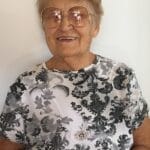
Anna Iolina, z"l (Ukraine)
I was born on January 27, 1931, in Kiev, the capital of Ukraine. My father, Yefim Iolin, was an engineer in a military factory. We lived as a large, extended family that included my grandparents, my parents, my little sister and me.
The war began in the Soviet Union on June 22, 1941. In August, the factory my father worked in began to evacuate to the east. Factory workers were allowed to bring their close relatives with them, but we could only bring a small amount of our belongings. We were crammed into railroad boxcars normally used to transport cattle. There were no bathrooms or sleeping accommodations. We were bombed along the way. In fact, on the second day of our trip, Nazi airplanes bombed us. Everyone jumped from the boxcars and lay down in a nearby, open field. The airplanes flew very low, spraying people on the ground with bullets, and I remember very well that our grandmother lay on top of my sister and me to cover us with her own body. Nearby, people were screaming and crying. I’ve had that awful memory my whole life.
We finally arrived in Gorky (now known as Nizhny Novgorod), where we were placed with locals in their apartments, several families to a room. Within a few months, Nazi forces began to bomb Gorky and their troops approached the city. A portion of the people evacuated to Tashkent and other cities in Central Asia. I can vividly recall how we were awakened by the bombs going off in the middle of the night, and how we ran to the bomb shelters.
With my father away in the Army, the rest of my family went to Tashkent. There were already many refugees there from cities the Germans had occupied in Ukraine, Belarus, and Russia. The Nazis were approaching Moscow. Near Stalingrad, the Russian army was successfully gaining control of Germans and it was a beginning of the victory.
In Tashkent we lived in a very little hut that was previously used as shed. Nevertheless, I am thankful to people in Uzbekistan for opening their homes to so many war refugees. My mother was working. I went to school. I believe we had best teachers there who also were refugees, many of them Jews. There was not much food. I remember how sometimes my mother was able to afford to buy us some pastry. My sister and I would split one piece. We lived in Tashkent until 1946, when we decided to return to Kiev.
Someone was living in our old apartment in Kiev, and we end up sharing one room with a few other families. Meanwhile, my father returned from the Army and was working in a Kiev in organization that helped restore bombed houses. When one of those houses was restored, we were able to move into our own apartment. I began the eighth grade there and went to the Kiev Mathematics School. Those post-war years in Kiev were extremely difficult. I remember that in school they gave us one spoonful of sugar and a piece of bread for breakfast, which came in handy.
I entered Kiev Polytechnic Institute in 1948 to study Electrical Technologies. I met my future husband Vladimir Tuv there, and in 1953 we married. We had two sons. My husband worked as mechanical engineer and I was an electrical engineer. In 1989, one of my sons and I immigrated to the United States of America. My husband didn’t want to leave, and died in Kiev in 1991. My other son was able to join us three years after we arrived in America.
